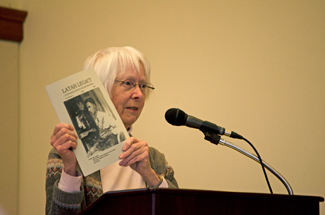UI Library introduces digital Latah County Oral History Collection
Although Latah County may seem relatively unassuming, it is a place with an extensive and complicated history, said Leah Evans-Janke, a representative from the University of Idaho anthropology laboratory.

Nathan Romans | Argonaut
Former Executive Director of the Latah County Historical Society Mary Reed speaks Wednesday at the 1912 Center during the launch party of the Latah County Oral History Digital Collection to the University of Idaho Library’s website.
Evans-Janke said the new oral history collection in the UI library has allowed her and a team of researchers to gain more insight into the community dynamics of Latah County’s past, such as the presence of the KKK in Elk River.
“Through studying these oral histories, we’ve learned a lot about what life was like in the early days of Latah County,” Evans-Janke said. “It was a very socially segregated community and also very secretive.”
Evans-Janke was one of the many speakers at the launch party for the Oral History Collection the UI Library hosted Wednesday at the 1912 Center in downtown Moscow.
Additional speakers included Devin Becker, UI digital librarian, and Erin Stoddart, interim head of special collections.
“These oral histories were originally collected in the 1970s by the Latah County Historical Society and were donated to the university,” Becker said. “We were approached a few years ago by a patron who expressed interest in seeing the transcripts of these histories added to our website.”
Becker said the collection, composed of more than 300 oral histories, is available online at the UI Library’s Digital Initiatives website.
Becker said the main challenge of the project was not the time it took to convert the audiotapes, but rather getting the audio and text from the transcripts to be available side by side on the web page.
“The website collection presents both the audio and the transcripts of these oral histories,” Becker said. “The digitalization of the transcripts did not take very long but we had about 570 hours of cassette tapes to convert.”
Becker said the conversion project, which began about two years ago, was made possible by a large team of student workers and UI faculty dedicated to digitalizing the hours of cassette tapes.
Stoddart, who assisted Becker in creating the oral histories branch of the website, said the online collection also features a tagging system, time stamps and synopses of interviews.
“There are a lot of layers that go on top of the digital audio collection,” Stoddart said. “We have subject tagging and time stamps, so if you stop at the 30-second mark of an interview, it will give you a short description of what they’re talking about at that point.”
Stoddart said the tagging system allows people to find oral histories based on key words, subject matter or geographical region.

Nathan Romans | Argonaut
Former Executive Director of the Latah County Historical Society Mary Reed speaks Wednesday at the 1912 Center during the launch party of the Latah County Oral History Digital Collection to the University of Idaho Library’s website. The collection can be found at: www.lib.uidaho.edu/digital/lcoh.
Becker said this particular collection is unique because it offers a look into the way of life in Latah County during its early developmental stages.
“It tells the stories that aren’t the official stories of the area,” Becker said. “It gives you a glimpse into what it was like to be a normal person in Latah County in the early 1900s.”
Becker said the oral history collection also allows for researchers to get a better sense of historical trends and how national events, such as the Great Depression, impacted the social environment of the region.
“This collection is more than just a set of old interviews,” Becker said. “It’s a way to look into the past, to understand a different time and to really get a sense of life from a different perspective.”
Corrin Bond can be reached at arg-news@uidaho. edu
